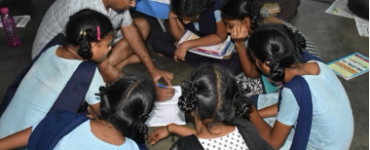Ramappa examined the head of the hosepipe. It was already frayed but with his last pull, rather a careless action, it broke and showed long plastic chasms on all sides like an imbalanced tree hovering on the edge of a valley with exposed roots. There was no way he could bind it with a cotton twine to allow a decent flow of water. He needed to ask the owner either for a total replacement of the pipe or a shorter new one, with a connector, to attach to this ghastly piece of nonsense.
In a plot of over 500 square yards, the house sat in a corner. The garden was carefully planned with larger shrubs lining the wall and a lawn connecting the two farthest ends on three sides. People often peered around it enviously on their walk up and down that road in Old Yelahanka. Perhaps on their trips to buy groceries from vendors that sold a good variety of red and boiled rice and pearl and little millets.
Ramappa was a careful mali. He raised most of the trees there and tended to all plants: removed dry leaves, pruned carefully, examined tenderly the blossoms and fruits and acted on soppy bits firmly.
As an extension of this discernment, he was also a good man, a clever man, carefully plotting his life of small means with two children and wife.
Much of last year went with no income; the owner lived at home and took care of the garden himself. His merchandising of spices and dry fruits brought an occasional bulk of import to the back of the house, and he managed the business from home. Ramappa saw many a day of hunger and pain. Children were restless, Sita didn’t speak to him on some days. He thought of leaving for Mandya for good, but those trips remained just short trips.
Ramappa hated the condition of the garden. Maintaining it was just not about removing the weeds. He threw the hosepipe away to turn off the main tap. There were two pensive kittens curled up on a mat refusing to engage him. He turned off the bulky lever and looked at the sky. One of those typical overcast Bangalore skies.
He went on working with the idea that he would convince the owner to buy a new pipe before it would rain in the afternoon. He collected the pruning kit, an old wicker basket and stepped out of the main gate to access the shrubs along the wall.
“Ramappa!” the jarring voice of the owner’s son disturbed his examination.
“What?”
“The Hindi lady wants to know if you can clean the plants in her balcony!”
Ramappa pushed the gate, peered at the boy. The 13-year-old had a phone in hand, a little away from his ear.
“Tell her I’m not here.”
He swirled the garden scissors in hand slashing air with a quick play of blades.
The boy rushed to the outside covering the mouth piece, “She’s heard you, says, she can see you too!” The boy swiftly looked in the direction of the end house of the cul de sac.
Ramappa was unperturbed. “So much the better,” he said as his scissors found a wilting branch.
He surveyed the soggy, brown, dead branches of small and big shrubs around. He cast a quick glance in the direction of the Hindi woman, who stood in the balcony of an old two-storied building. Most of the local workers called those who spoke in Hindi as ‘Hindi women’ or ‘Hindi men’. A common term to denote North Indians even if they spoke Bengali or Haryanvi or switched between their languages and Kannada.
Ramappa shook his head, and bent to regain his attention when he caught the act of a man across the street, facing an open plot, relieving himself.
“Reyy…” Ramappa screamed and almost threw the scissors away to catch the man.
“Ramappa,” whispered the owner’s son, annoyingly further. “She says, she would implicate you in a police case if you refused! Her husband’s brother is an officer,” the boy paused. “She says.”
Ramappa calmly turned to the boy. “Please tell her to come here, level the charges, and bring the police. Ok?” The boy ran inside.
He diverted his attention to the man who was quickly zipping his pants and running away.
Ramappa ran after him and had caught him. “How many times should the owner warn you to not do it here, uh?”
The poor man folded his hands and mumbled something, but Ramappa was distracted by the angry swagger of the Hindi lady.
Ramappa did not leave the man but dragged him to the other side of the road to meet the woman.
“What is this I hear from the boy?” she gave him an icy look and quickly cast a glance at the man in hand.
“Go inside the house, ma’am. I will talk to you.”
“I don’t want to go in. It’s not my house, and you only work there. Whatever you want to say, you say it here,” she thundered. She cast another glance at Ramappa’s grip on the man.
Ramappa pushed the gate open with his left hand, enabling a better view of the garden.
“What do you see?”
She didn’t know where to look and what to look for. The thick rose trunks had delicate shoots, the hybrid dwarf lemon plant had many lemons on it. The jackfruit at a distance had a couple of large fruits clinging to the trunk. No one seemed to have plucked the pink jasmine from the vine and it was abloom happily. There was custard apple in a corner, mums near the shed, oleanders away toward the kitchen, lobelias thinly spread in pots, and petunia hung around the portico. She quietly lamented the beauty. His hands truly had a magic to them!
“Why do I ask for you, if your work is not good?” she said begrudgingly. “It’s nice. Now, when are you coming?”
The man under the grip kept mumbling. Ramappa gave her a cold stare. She thinks this is a good garden? What a tasteless woman.
“It has to be Rs 1000/- plus, rice and arrack!” He said with a straight face.
She was aghast.
“For a maximum of two hours of cleaning potted plants in a small balcony? You must be mad!”
“If you hadn’t taken the name of the police, it would have been just Rs 1000/- But now that you brought your family members into the bargain, and they belonged to the police, it wouldn’t be any cheaper!”
The Hindi woman almost had a veil of tears.
Ramappa continued. “Look at this fellow. We warned him several times not to piss on the grounds opposite this house. Did he listen? No. He would always do it, and always run away! Would any one bring the police to catch him? No. I make a good garden, and you need a pair of good hands to tend to your plants and you want to file a police complaint against me? Where is justice in this world?” Ramappa raised his voice.
The woman felt the crunch of bones in her jaw. It was a kind of foreign pain that she experienced. Her brow and upper lip had mild sweat. She looked at the tramp again, turned to Ramappa.
“Don’t delay, just come by 3pm, which works for me. I have guests coming over later.”
There was no let-up to Ramappa’s grip as he saw the woman walk away.
He murmured in the poor man’s ear. “Come and collect some sachets of arrack after 7pm. Thanks for being obedient.”
The poor man smiled through his tears and sighed heavily when the crumpled collar fell on his neck meekly.
Ramappa washed his hands, kicked the pipe and collected the tools to start work.
Later that afternoon, he carried two healthy, half-opened yellow roses on branch, to the lady.
Her brow eased into a pleasant smile.
She packed goodies along with his demands that evening and looked pleased.
*









Good story👌👌👌
Thank you